
Liberty's Refuge: The Forgotten Freedom of Assembly PDF
Preview Liberty's Refuge: The Forgotten Freedom of Assembly
LIBERTY’S REFUGE This page intentionally left blank L I B E R T Y ’ S R E F U G E THE FORGOTTEN FREEDOM OF ASSEMBLY John D. Inazu New Haven & London Copyright © 2012 by John D. Inazu. All rights reserved. Subject to the exception immediately following, this book may not be reproduced, in whole or in part, including illustrations, in any form (beyond that copying permitted by Sections 107 and 108 of the U.S. Copyright Law and except by reviewers for the public press), without written permission from the publishers. The author has made an online version of this work available under a Creative Commons Attribution-Noncommercial-Share Alike 3.0 License. It can be accessed through the author’s Web site at http://libertys-refuge.wustl.edu. Yale University Press books may be purchased in quantity for educational, business, or promotional use. For information, please e-mail [email protected] (U.S. office) or [email protected] (U.K. office). Set in Baskerville type by IDS Infotech Ltd., Chandigarh, India. Printed in the United States of America. Library of Congress Cataloging-in-Publication Data Inazu, John D. Library’s refuge : the forgotten freedom of assembly / John D. Inazu. p.cm. Includes bibliographical references and index. ISBN 978-0-300-17315-4 (cloth : alk. paper) 1. Assembly, Right of—United States. 2. Freedom of association—United States. I. Title. KF4778.153 2012 342.7308'54–dc23 2011021414 A catalogue record for this book is available from the British Library. This paper meets the requirements of ANSI/NISO Z39.48–1992 (Permanence of Paper). 10 9 8 7 6 5 4 3 2 1 For Byrd and Taizo This page intentionally left blank CONTENTS Acknowledgments, ix CHAPTER 1. Overview of the Argument, 1 CHAPTER 2. The Right Peaceably to Assemble, 20 CHAPTER 3. The Emergence of Association in the National Security Era, 63 CHAPTER 4. The Transformation of Association in the Equality Era, 118 CHAPTER 5. A Theory of Assembly, 150 Conclusion, 185 Notes, 187 Index, 253 This page intentionally left blank ACKNOWLEDGMENTS I am grateful for substantial advice and comments from Jeff Spinner- Halev, Mike Lienesch, Stanley Hauerwas, Jeff Powell, Susan Bickford, Amin Aminfar, Rick Garnett, Guy-Uriel Charles, and James Boyle. I owe a particular note of thanks to Andy Koppelman for his generous engage- ment with a book with which he has many disagreements. Thanks also to Rob Vischer, Gerald Postema, Jim Skillen, Bob Cochran, Kristen Johnson, Max Eichner, Tabatha Abu El-Haj, Roman Hoyos, Neil Siegel, Nathan Chapman, Bill English, Kim Krawiec, Jed Purdy, Bill Marshall, Larry Helfer, Stuart Benjamin, Jack Knight, Joseph Blocher, Sara Beale, David Lange, Ryan Messmore, Jonathan Mitchell, Ernie Young, Steve Smith, Paul Haagen, Michael Curtis, Dan Blinka, and Jason Mazzone. This book benefited from audiences at the Harvard Graduate Conference in Political Theory and faculty workshops at Duke University School of Law and the University of North Carolina School of Law. Thanks to the library staffs at Duke University School of Law (especially Jennifer Behrens, Molly Brownfield, and Kelly Leong), the University of North Carolina, and Syracuse University. The final stages of this ix
